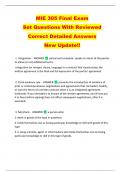Exam (elaborations)
MIE 305 Final Exam Set Questions With Reviewed Correct Detailed Answers New Update!!
- Module
- Institution
MIE 305 Final Exam Set Questions With Reviewed Correct Detailed Answers New Update!! 1. Integration - ANSWER partial and complete- speaks to intent of the parties to allow (or not) additional terms. -integration (or merger) clause: language in a contract that clearly states the w...
[Show more]



